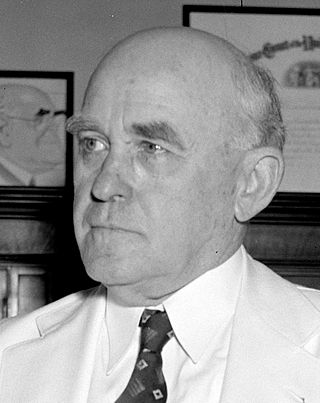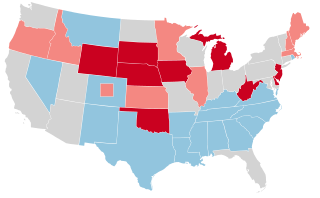
William Brockman Bankhead was an American politician who served as the 42nd speaker of the United States House of Representatives from 1936 to 1940, representing Alabama's 10th and later 7th congressional districts as a Democrat from 1917 to 1940. Bankhead was a strong liberal and a prominent supporter of President Franklin Roosevelt's New Deal of pro-labor union legislation, thus clashing with most other Southern Democrats in Congress at the time. Bankhead described himself as proud to be a politician, by which he meant that he did not neglect matters that concerned his district or reelection. He was the father of actress Tallulah Bankhead.

James Thomas Heflin, nicknamed "Cotton Tom", was an American politician who served as a United States representative and United States senator from Alabama.

John Hollis Bankhead was an American politician and Confederate Army soldier. A member of the Democratic Party, Bankhead served as U.S. Senator from the state of Alabama from 1907 until his death in 1920. Bankhead had additionally served in the United States House of Representatives, the Alabama Legislature, and as warden of the state penitentiary in Wetumpka.

John Hollis Bankhead II was a U.S. senator from the state of Alabama. Like his father, John H. Bankhead, he was elected three times to the Senate, and like his father, he died in office.

The 1972 United States Senate elections were held on November 7, with the 33 seats of Class 2 contested in regular elections. They coincided with the landslide re-election of Republican President Richard Nixon. Despite Nixon's landslide victory, Democrats increased their majority by two seats. The Democrats picked up open seats in Kentucky and South Dakota, and defeated four incumbent senators: Gordon Allott of Colorado, J. Caleb Boggs of Delaware, Jack Miller of Iowa, and Margaret Chase Smith of Maine. The Republicans picked up open seats in New Mexico, North Carolina, and Oklahoma, and defeated one incumbent, William B. Spong Jr. of Virginia.

The 1942 United States Senate elections were held November 3, 1942, midway through Franklin D. Roosevelt's third term as president. The 32 seats of Class 2 were contested in regular elections, and two special elections were held to fill vacancies.

The 74th United States Congress was a meeting of the legislative branch of the United States federal government, composed of the United States Senate and the United States House of Representatives. It met in Washington, D.C., from January 3, 1935, to January 3, 1937, during the third and fourth years of Franklin D. Roosevelt's presidency. The apportionment of seats in the House of Representatives was based on the 1930 United States census.

The 77th United States Congress was a meeting of the legislative branch of the United States federal government, composed of the United States Senate and the United States House of Representatives. It met in Washington, D.C., from January 3, 1941, to January 3, 1943, during the ninth and tenth years of Franklin D. Roosevelt's presidency. The apportionment of seats in the House of Representatives was based on the 1930 United States census.

The 75th United States Congress was a meeting of the legislative branch of the United States federal government, composed of the United States Senate and the United States House of Representatives. It met in Washington, D.C., from January 3, 1937, to January 3, 1939, during the fifth and sixth years of Franklin D. Roosevelt's presidency.

The 76th United States Congress was a meeting of the legislative branch of the United States federal government, composed of the United States Senate and the United States House of Representatives. It met in Washington, D.C., from January 3, 1939, to January 3, 1941, during the seventh and eighth years of Franklin D. Roosevelt's presidency. The apportionment of seats in the House of Representatives was based on the 1930 United States census.
Walter Will Bankhead was an American politician. A member of the Democratic Party, he served as U.S. Representative from Alabama in 1941. He was the son of John Hollis Bankhead II and the grandson of John H. Bankhead, both of whom represented Alabama in the United States Senate.

The 1906–07 United States Senate elections were held on various dates in various states. As these U.S. Senate elections were prior to the ratification of the Seventeenth Amendment in 1913, senators were chosen by state legislatures. Senators were elected over a wide range of time throughout 1906 and 1907, and a seat may have been filled months late or remained vacant due to legislative deadlock. In these elections, terms were up for the senators in Class 2.

The 1930 United States Senate election in Alabama was held on November 4, 1930.

The 1924 United States Senate election in Alabama was held on November 4, 1924.

The 1936 United States Senate election in Alabama was held on November 2, 1936.

The 1948 United States Senate election in Alabama was held on November 2, 1948.

The 1942 United States Senate election in Mississippi was held on November 3, 1942. Incumbent Democratic U.S. Senator Wall Doxey, who had won a special election the year prior to complete the unexpired term of Pat Harrison, ran for a full term in office. He was defeated by James Eastland who was appointed to and held the seat prior to Doxey's wins.

The 1942 United States Senate special election in Minnesota took place on November 3, 1942. The election was held to fill the vacancy in the seat formerly held by the late Ernest Lundeen for the final two months of Lundeen's unexpired term. Governor Harold Stassen had appointed Joseph H. Ball to fill the seat in 1940, but this appointment was temporary and subject to a special election held in the next general election year thereafter—1942. Ball opted to run for the full six-year term immediately following the end of Lundeen's term, instead of running for election to continue for the remainder of the term. In Ball's stead, the Republican Party of Minnesota nominated Arthur E. Nelson, who, in the special election, defeated both of his challengers—Al Hansen of the Farmer–Labor Party of Minnesota and John E. O'Rourke of the Minnesota Democratic Party.
There were three special elections to the United States Senate in 1941 during the 77th United States Congress.
















